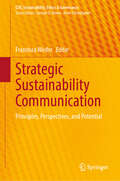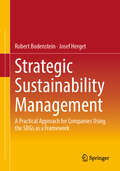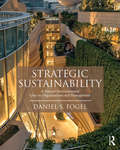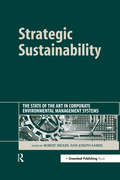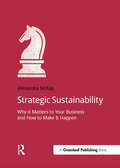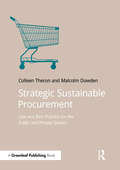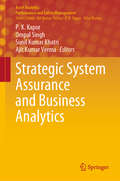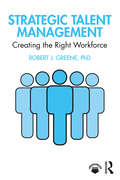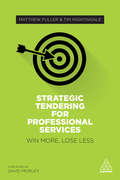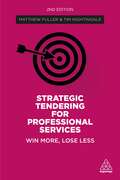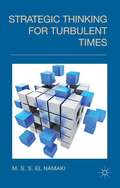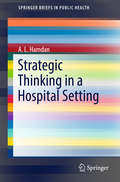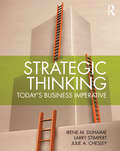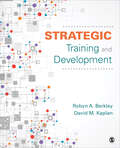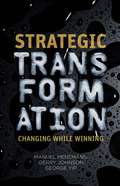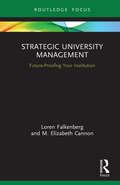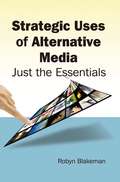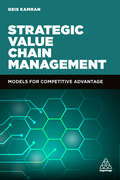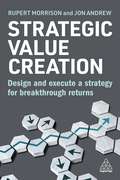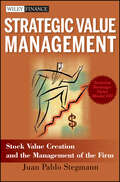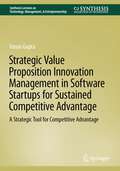- Table View
- List View
Strategic Sustainability Communication: Principles, Perspectives, and Potential (CSR, Sustainability, Ethics & Governance)
by Franzisca WederThis book discusses the evolution of the sustainability story in corporate, political, and environmental discourses as well as paradigms and theoretical approaches to better understand communication about, of, and for sustainability. The book aims to be a preferred resource for academics, scholars, students as well as practitioners in environmental management, communication management, journalism as well as sustainability studies. The authors elaborate on various conceptual perspectives on strategic sustainability communication and offer practical examples and exercises for making sustainability and related issues accessible and comprehensible, for co-creating social change and taking authorship in new emerging professions like Sustainability Manager and Officer. Furthermore, the volume explores methodological as well as pedagogical innovations, complemented by case studies and interviews around existing strategies and tactics to create sustainable solutions (communication planning, campaigning, messaging, etc.). Thus, it offers students and instructors as well as (future) communication strategists and campaigners foundations, strategies, tools, and methodologies of communication for transformation and co-creation of alternative narratives. Professionals, advocates, and academics are attracted who are passionate about taking proactive roles in restoratively addressing the pressing interrelated sociocultural and ecological issues of our times and seek to be reflexive leaders and advocates.
Strategic Sustainability Management: A Practical Approach for Companies Using the SDGs as a Framework
by Josef Herget Robert BodensteinThis book provides a practical guide to implementing sustainability strategies within companies. It introduces a model-based approach that enables a comprehensive, yet focused strategy, ensuring that complexity doesn’t overshadow the core objectives. The concept of Sustainability Excellence offers a versatile methodology, designed to meet the needs of both large corporations and small businesses with limited resources. The approach is adaptable to various sustainability frameworks and strategies. To demonstrate its application, the book uses the United Nations’ Sustainable Development Goals (SDGs) as a concrete example of how the method can be put into practice. Special emphasis is placed on integrating the sustainability strategy into the corporate culture, ensuring it becomes a fundamental part of the organization's DNA. The book is enriched with practical tools, including checklists and insights into the opportunities and risks of sustainability management. It is a valuable resource for managers, business owners, consultants, and anyone interested in shaping effective sustainability strategies within their organizations.
Strategic Sustainability: A Natural Environmental Lens on Organizations and Management
by Daniel S. FogelStrategic Sustainability examines how organizations can implement environmental sustainability science, theories, and ways of thinking to become more competitive. Including examples and ideas implemented in various countries, it is based on known scientific principles about the natural world and organizational principles focusing on the work domain. The intersection of these two realms of research creates a powerful and new approach to comprehensive, seemingly contradictory issues. Daniel S. Fogel draws from disparate fields and creates a story about organizations, their future and how people are part of the problem and, more importantly, part of the solution. Readers will find ways to take action to improve organizations and avoid denigrating our natural environment, learning to be mindful of the urgency we should feel to improve our impact on the world. The focus on the natural environment provides a powerful focus for creating value in organizations and addressing the major challenges we all face. Advanced sustainability students, working professionals and board members, managers and legislators responsible for governing organizations or implementing public policy will find this book useful. A companion website features an instructor’s manual with test questions, as well as 38, 10-minute videos for classroom use.
Strategic Sustainability: The State of the Art in Corporate Environmental Management Systems
by Robert Sroufe Sarkis JosephThe last decade has seen increasing awareness of the importance of understanding corporate environmental management systems (EMSs) and their relationships with sustainability, competitiveness and institutional practice. It is now assumed that most large companies have some version of an EMS in place with systems ranging from informal policies and practices to formalised third-party certified systems that are widely publicized by companies and are now integral to their strategic direction. No matter what level and type of system a firm chooses, both practitioners and researchers wish to examine and better understand the extent to which these systems are cross-functional, how they impact on performance evaluation, their capability to monitor supply chains and the life-cycles of products and services and, most importantly, whether these systems actually make a contribution to better environmental performance. This book provides intriguing insights into strategic and sustainable EMSs. It provides clear evidence of benefits that should exceed the costs (tangible and otherwise), and help practitioners understand the attributes of well-developed and strategically focused EMSs. It also demonstrates the link to performance measures such as reputation, improved position in the marketplace, cost, quality, waste reduction and numerous sustainable development-based metrics and issues. The comprehensive scope of topics spans several industries and provides environmental systems insight involving sustainable management systems, strategic and operational impacts of environmental systems, cross-country comparisons of EMS design processes and results, product-based environmental systems, EMS impacts at innovative organisations and environmental systems integration within specific industries. The book is split into three sections. First, the book covers the broad issues of planning and designing an EMS and includes topics such as performance evaluation, comparisons between multinational environmental systems, sustainable development and links between already established quality systems and an EMS. The second section focuses on EMS implementation and operation and incorporates some corporate or industry-specific case studies. The third and final category of the book highlights the use of an EMS to evaluate business processes. Strategic Sustainability will be essential reading for both managers faced with decisions regarding their own EMSs and to researchers seeking additional insights from state-of-the-art examples for further theoretical development and testing.
Strategic Sustainability: Why it matters to your business and how to make it happen (Doshorts Ser.)
by Alexandra McKayIn many businesses sustainability is one person’s passion and responsibility. A large part of their job becomes selling sustainability to other people in the business.This book offers arguments, information and tactics will help that person get the buy-in they need to move sustainability forward in their business.Strategic Sustainability: sets out why sustainability matters to businesses – the benefits to you and your stakeholders; shows how to identify the biggest issues, impacts and wins for your business; helps you identify the resources you will need to put sustainability at the heart of your business; outlines key reasons why businesses that are not multinationals should take action on sustainability, and how to do it; looks in detail at how to integrate sustainability with business strategy and mission.Sustainability is of strategic importance to a business. This book makes an airtight case for why action is essential and how sustainability can help a business not only survive but thrive in competitive marketplaces.
Strategic Sustainable Procurement: Law and Best Practice for the Public and Private Sectors (Doshorts Ser.)
by Colleen Theron Malcolm DowdenProcurement is playing an increasingly strategic role as a lever for sustainable development and social and environmental responsibility. Greater regulation on sustainable procurement in the public sector, including significant changes to the EU Directive in April 2014, are driving this change.This comprehensive guide to sustainable procurement by practising legal experts Colleen Theron and Malcolm Dowden distils key developments in EU and UK public sustainable procurement legislation, government guidance and policy; provides an introduction to sustainable procurement more broadly; provides case studies and practical examples on contractual aspects of procurement; shows you how to set up a sustainable procurement strategy; and contributes to the development of sustainable procurement policy. There is also increased emphasis on "clean" supply chains in the private sector, as best practice seeks to mesh with public sector requirements and reduce the risk that bids for public contracts might be undermined by adverse environmental impacts or social misconduct along the supply chain.Private sector companies should act now to establish best practice sustainable procurement principles to minimize the risk of litigation; several international standards are embedding the principles of sustainable procurement into their requirements.The book also offers practical examples of what sustainable procurement entails, whether the organization is bidding for public sector contracts, in need of meeting tender requirements, looking to obtain certification for a standard, or is simply seeking to improve its supply chain management and implement best practice.
Strategic System Assurance and Business Analytics (Asset Analytics)
by Ajit Kumar Verma P. K. Kapur Ompal Singh Sunil Kumar KhatriThis book systematically examines and quantifies industrial problems by assessing the complexity and safety of large systems. It includes chapters on system performance management, software reliability assessment, testing, quality management, analysis using soft computing techniques, management analytics, and business analytics, with a clear focus on exploring real-world business issues. Through contributions from researchers working in the area of performance, management, and business analytics, it explores the development of new methods and approaches to improve business by gaining knowledge from bulk data. With system performance analytics, companies are now able to drive performance and provide actionable insights for each level and for every role using key indicators, generate mobile-enabled scorecards, time series-based analysis using charts, and dashboards.In the current dynamic environment, a viable tool known as multi-criteria decision analysis (MCDA) is increasingly being adopted to deal with complex business decisions. MCDA is an important decision support tool for analyzing goals and providing optimal solutions and alternatives. It comprises several distinct techniques, which are implemented by specialized decision-making packages. This book addresses a number of important MCDA methods, such as DEMATEL, TOPSIS, AHP, MAUT, and Intuitionistic Fuzzy MCDM, which make it possible to derive maximum utility in the area of analytics. As such, it is a valuable resource for researchers and academicians, as well as practitioners and business experts.
Strategic Talent Management
by Paul Sparrow Hugh Scullion Ibraiz Tarique Paul Sparrow Hugh ScullionWith contributions from leading scholars and practitioners, this Cambridge Companion examines the topical issue of talent management from a strategic perspective, mapping out insights from a number of related fields including strategy, organisational learning, marketing and supply chain management. The authors examine the challenges faced when viewing talent management in a global context, showing how both comparative and international HRM thinking have become increasingly important when, for example, managing talent in emerging markets or trying to globalise the talent management function. The book concludes with a valuable summary of key learning points about talent management for both practitioners and researchers, as well as a discussion of the most fruitful areas for future research. This Companion will be an essential resource for academic researchers, graduate students and practitioners of global strategic talent management.
Strategic Talent Management: Creating the Right Workforce
by Robert GreeneClearly written and providing actionable strategies, this book explores new paradigms for workforce management to enable human resource managers and the organizations where they work to thrive in today’s turbulent business environment. Robert Greene goes beyond the many human resource management books currently available, to deal head-on with the new realities of talent management, including such factors as the "gig economy" and globalization. The book focuses on attracting, developing, and effectively utilizing human capital. It begins with human capital planning, and then explores strategies and programs that can attract and retain the workforce an organization needs. A range of sizes and types of organizations and different working relationships are considered, as Greene demonstrates how to evaluate the effectiveness of strategies that fit specific contexts and will sustain the viability of an organization’s workforce into the future. Postgraduate students of human resource management, as well as current HR professionals and managers, will find this practical book an indispensable resource. PowerPoint slides and test banks are available to support instructors.
Strategic Tendering for Professional Services: Win More, Lose Less
by Matthew Fuller Tim NightingaleCompetitive bidding for work is a long-established aspect of business within the professional services and consulting sector. For many markets, pitching has become a critical element of both attracting and retaining business. Combating clients' demands and intense competition, firms that want to win and retain business need business development and marketing teams that are experts in creating compelling proposals. Strategic Tendering for Professional Services offers a masterclass in improving your pitching skills and processes.Drawing on insights from current pitch and proposal professionals and client-side procurement teams, Strategic Tendering for Professional Services provides end-to-end best practice guidance. From the crucial decision of which request-for-proposals (RFPs) to respond to, right through to the all-important face-to-face presentation and post-pitch follow-up, this practical handbook leads readers through all stages of the process on best practice and strategies for success. Packed with practical features to help readers put guidance into practice, Strategic Tendering for Professional Services also supports business-wide improvement with a clear analysis of the processes and systems available to support pitch assembly and reporting. Whether you are a bid and proposal professional looking for extra tools, a business development or marketing manager providing support and expertise to partners, or a professional wanting to improve pitching skills, this book will be key to winning opportunities that will set the firm apart.
Strategic Tendering for Professional Services: Win More, Lose Less
by Matthew Fuller Tim NightingaleWINNER: Business Book Awards 2018 - 'Selling The Dream' category (1st edition)In an increasingly competitive professional services sector, it is vital that firms have an effective tendering strategy. The advantages gained from winning and retaining clients can be transformative, and the cost of losing key tenders can be catastrophic. Strategic Tendering for Professional Services provides end-to-end best practice guidance, from the crucial decision of which request-for-proposals to respond to, right through to the all important face-to-face presentation and post-pitch follow-up. Now in its second edition, this practical book captures insights from both sides of the market through interviews with both proposal professionals and decision makers from the client side. Focusing on key considerations, including the need for diversity and inclusion, providing evidence of global citizenship and how public sector pitching differs from the private sector, this book is packed with features and tools to help professionals turn guidance into practice. Strategic Tendering for Professional Services is the essential guide to improving your pitches, honing your tendering skills and boosting your win rate.
Strategic Thinking Illustrated: Strategy Made Visual Using Systems Thinking
by Dennis SherwoodThis book is about the behaviour of systems. Systems are important, for we interact with them all the time, and many of the actions we take are influenced by a system – for example, the system of performance measures in an organisation influences, often very strongly, how individuals within that organisation behave. Furthermore, sometimes we are involved in the design of systems, as is any manager contributing to the definition of what those performance measures might be. That manager will want to ensure that all the proposed performance measures will drive the ‘right’ behaviours rather than (inadvertently) encouraging dysfunctional ‘game playing’, and so anticipating how the performance measurement system will work in practice is a vital part of a wise design process. Some of the systems with which we interact are local, such as your organisation’s performance measurement system. Some systems, however, are distant, but nonetheless very real, such as the healthcare system, the education system, the legal system and the climate system. Systems, therefore, exist on all scales, from the local to the global. And all systems are complex, some hugely so. That’s why understanding how systems behave can be very helpful. Systems are complex for two main reasons. First, the manner in which they behave over time can be very hard to anticipate – and anticipating the future sensibly is of course a key objective of management. Second, the ‘entities’ within a system can be connected together in very complex ways, so that an intervention ‘here’ can result in an effect ‘there’, perhaps a long time afterward. Sometimes this can be surprising, and so we talk of ‘unintended consequences’ – but this is of course a euphemism for ‘because I didn’t understand how this system behaves, I had not anticipated that’. Systems thinking, the subject matter of this book, is the disciplined study of systems, and causal loop diagrams – the ‘pictures’ of this ‘picture book’ – are a very insightful way to represent the connectedness of the entities from which any system is composed, so taming that system’s complexity.
Strategic Thinking for Turbulent Times
by M. S. S. el NamakiStrategic Thinking for Turbulent Times is a conceptual and operational guide to the process of business strategy formulation within a turbulence driven economic and business environment. This book features pioneering work on the process of strategic thinking after the dramatic shift in the fundamental premises of strategic management.
Strategic Thinking in a Hospital Setting
by A. L. HamdanTranslating the realities of healthcare reform and healthcare costs into competitive hospital practice is the goal of this accessible, jargon-free guide. Taking its cue from Michael Porter’s highly-regarded business strategies, it offers a sound framework for hospitals looking to develop efficient, patient-centered service delivery, identifying keys to clinical, administrative, and marketing success. The book organizes business and clinical priorities where they intersect so that physicians throughout healthcare systems can understand their role in building and sustaining innovation, and leverage their strengths and system resources toward meeting patient needs. In addition, chapters review eight core strategic tools, describe possibilities for their implementation, and provide in-depth findings on Porter’s methods as used in a diverse group of hospitals across Lebanon. Included in the coverage: · Porter’s strategies in health care: cost leadership versus differentiation strategy · Sources of competitive advantage · How to prepare an organization for innovation · Strategic framework in a hospital setting · Application of Porter’s strategies in Lebanese hospitals · Correlation between type of strategy and performanceA well-designed blueprint for enhancing patient satisfaction and system cost-effectiveness, Strategic Thinking in a Hospital Setting is aimed at both frontline physicians in practice and those assuming administrative positions in healthcare facilities and in hospital settings in particular.
Strategic Thinking: Today’s Business Imperative
by Irene M. Duhaime Larry Stimpert Julie ChesleyThere are many strategy books available in the marketplace for today’s student or business professional; most of them view strategy from the 10,000 foot level, while Strategic Thinking looks at this important business topic through a different lens. Written from the perspective of a manager, this book builds on theories of managerial and organizational cognition that have had a powerful influence on many business fields over the last two decades. As other books on business policy and strategy cover a broad range of topics, models, frameworks, and theories, the unique feature of this book is that it covers all this, but also focuses on how managers of business firms understand their business environments, assess and marshal their firms’ resources, and strive for advantage in the competitive marketplace. It examines the economic, structural, and managerial explanations for firm performance. Offering professors and business people who are intrigued by the ideas introduced in Peter Senge’s books ways to apply those ideas and principles in the classroom and in the companies in which they work, the book puts managers front and center.
Strategic Training and Development
by David M. Kaplan Robyn Ann BerkleyPeople are the most important resource for today′s organizations. Organizations must invest in their employees to sustain a competitive advantage and achieve their strategic objectives. Strategic Training and Development translates theory and research into best practices for improving employee knowledge, skills, and behaviors in the workplace. Authors Robyn A. Berkley and David M. Kaplan take a holistic and experiential approach, providing ample practice opportunities for students. A strong focus on technology, ethics, legal issues, diversity and inclusion, and succession helps prepare students to succeed in today’s business environment.
Strategic Training and Development
by David M. Kaplan Robyn Ann BerkleyPeople are the most important resource for today′s organizations. Organizations must invest in their employees to sustain a competitive advantage and achieve their strategic objectives. Strategic Training and Development translates theory and research into best practices for improving employee knowledge, skills, and behaviors in the workplace. Authors Robyn A. Berkley and David M. Kaplan take a holistic and experiential approach, providing ample practice opportunities for students. A strong focus on technology, ethics, legal issues, diversity and inclusion, and succession helps prepare students to succeed in today’s business environment.
Strategic Transformation
by Gerry Johnson Manuel Hensmans George YipVery few companies are successful in undertaking strategic transformation while maintaining long term superior financial performance. This book, by leading strategy experts, draws upon extensive interviews with business leaders and insights from companies faced with this challenge.
Strategic Treaty Management
by Thomas F. McinerneyWhile little recognized in international law scholarship, multilateral treaties in diverse fields have begun to apply strategic management techniques to make them more effective and responsive. This examination of those practices and their interplay with associated international organizations considers the application of strategic management across treaties' planning, financing, implementation, and evaluation activities. The study leads to a new appreciation of the intricacies of multilateral treaty activities and a better understanding of their operations within complex webs of networked international institutions. In considering different approaches to steering treaties through this dispersed global governance landscape, Thomas F. McInerney draws on current strategic management literature to explore the utility of nonlinear, emergent models of strategy and gain insights from strategy as practice research. While recognizing strategic management's potential value in facilitating more flexible applications of multilateral agreements, he also emphasizes the need to maintain their normativity as international legal obligations.
Strategic University Management: Future Proofing Your Institution (Routledge Focus on Business and Management)
by Loren Falkenberg M. Elizabeth CannonUniversities are being buffeted by multiple disruptive trends, including increased competition for both funding and students, as well as from new institutions that are nimbler and more responsive to the external environment. To survive this reality, university leaders must engage in effective strategic planning that cascades from the president or vice-chancellor’s office to individual faculty and staff. Outcomes of an effective institutional strategy are the alignment of resource allocation with strategic goals, and the facilitation of clear and transparent decision-making for new program development, research capacity growth, and infrastructure investment. With increasing expectations for university leaders to engage in strategic planning, Strategic University Management: Future Proofing Your Institution provides a practical framework for managing the process and delivering results. This book illustrates that the inherent weaving of strategic planning and organizational culture through engaged consultation facilitates a culture of responsiveness, rather than complacency. Providing an in depth overview of the value strategy can create in universities, it provides a framework for initiating, implementing and assessing strategic planning in a university setting that will make it valuable to researchers, academics, university leaders, and students in the fields of strategic planning, organizational studies, leadership, and higher education management.
Strategic Uses of Alternative Media: Just the Essentials
by Robyn BlakemenDesigned for students and practitioners in the fields of organizational behavior and human resource training and development, this book examines improving organizational communication. Terrence Gargiulo shows how the use of storytelling is the key to effective communication and learning.
Strategic Value Chain Management: Models for Competitive Advantage
by Dr Qeis KamranA supply chain is the process of all parties involved in fulfilling a customer request, while a value chain is a set of interrelated activities a company uses to create value and a competitive advantage. In Strategic Value Chain Management the authors bring together a variety of disciplines, showing how to move from traditional supply chain management to value chain management. Research from the (ISM) International School of Management, Germany, originating from a network of companies in a range of sectors, is integrated with case studies to demonstrate particular concepts.Strategic Value Chain Management brings together theory and practice and presents tangible ways of creating competitiveness in a changing world through the use of effective models and frameworks. Challenging the traditional Porters Five Forces Model, the authors introduce the important academic disciplines of cybernetics and systems sciences as essential drivers of strategy within the supply chain, supported by case studies illustrating their implementation.
Strategic Value Creation: Design and Execute a Strategy for Breakthrough Returns
by Rupert Morrison Jon AndrewStrategic Value Creation shows how senior business leaders can design and execute a data-driven strategy for their organizations to ensure that value creation is focused on the customer segments most integral to business success.Value creation underpins any successful business and businesses that fail to create unique value for their customers will struggle to survive. This book demonstrates how to recognize when strategy, thinking and actions are flawed, how to correct these and how to devise and implement an effective strategy that unlocks the power of value creation. It provides the practical tools necessary to put strategic theories and frameworks into practice and explains the data needed at every step.Strategic Value Creation shares the powerful 4Ds framework for strategy execution: Diagnose today, Design tomorrow, Draw the plan and Deliver with data. This framework outlines how to use data for diagnosis, analyse value factors for customer segmentation, determine the value factors their customers value the most and ensure differentiation from competitors. It also covers how to track and measure performance against stated objectives and risks, improve board packs, board back commentary and board meeting effectiveness, and capture and categorize actions, ensuring they are managed effectively.
Strategic Value Management
by Stegmann Juan PabloInnovative strategic management solutions for today's market Strategic Value Management addresses common problems among business managers and other professionals involved in thinking about developing and managing organizations. In it, author Juan Pablo Stegmann integrates all strategic management and business strategy into an innovative standard that introduces key metrics to strategic management and stock value creation. He argues that most complex business issues can be reduced to the three dimensions of stock value creation-profits, sales growth, and capital-that are linked to three critical strategic management decisions-competition, innovation, and resources. His new approach indicates that every strategy has a clear dollar metric, which can measure its consequences of the strategies in terms of stock value. Competitive and growth strategies are analyzed along with economic, financial, dynamic, and contingent approaches Includes a companion CD-ROM, which contains Stegmann's proven model for strategic management and stock value creation Ethical consequences of strategic decisions are introduced-showing how ethics are linked to long-term stock value creation Explains the roots of the current financial crisis by examining the link between the financial world and strategic management, and proposes possible solutions For any looking to enhance their understanding of this discipline, Strategic Value Management offers a new conceptual model for thinking about business strategy and its link to stock value creation.
Strategic Value Proposition Innovation Management in Software Startups for Sustained Competitive Advantage: A Strategic Tool for Competitive Advantage (Synthesis Lectures on Technology, Management, & Entrepreneurship)
by Varun GuptaThis book aims to increase the success rates of startups by focusing on value proposition innovation, which is propelled by the involvement of potential consumers as well as other resources such as freelancers and strategic relationships with academia. The author shows how startups who are resource constrained can invest efforts exploring the potential market of their products. The author also explores how global markets can be beneficial for a startup’s success, while showing the workarounds in hard-to-access markets. The book investigates gaining knowledge shared by freelancers, customers, and academia, whose involvement can be crucial in supporting value proposition innovation activities such as ideas generation, implementation, and commercialization. Combined, the author leads readers to discover their ability to foster value proposition innovations that result into long term competitive advantage in a highly fluctuating business environment.
